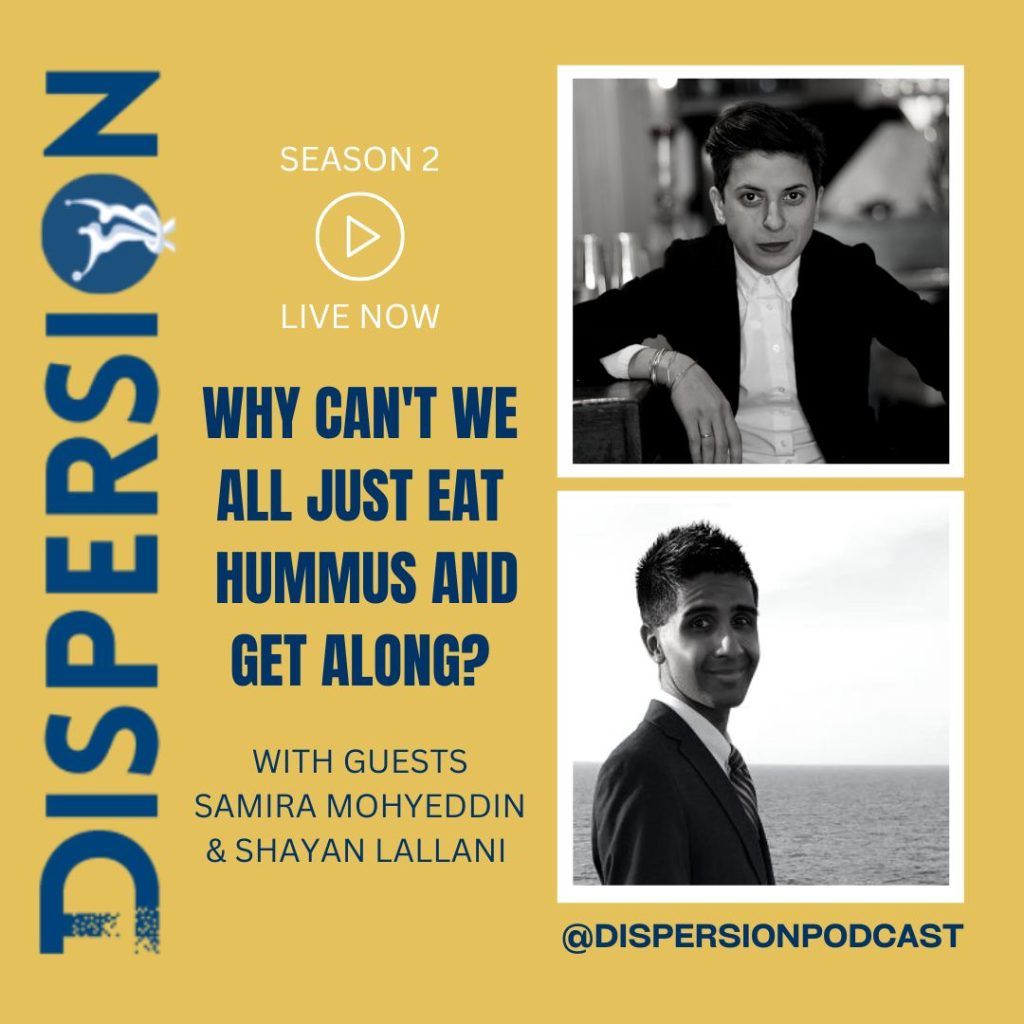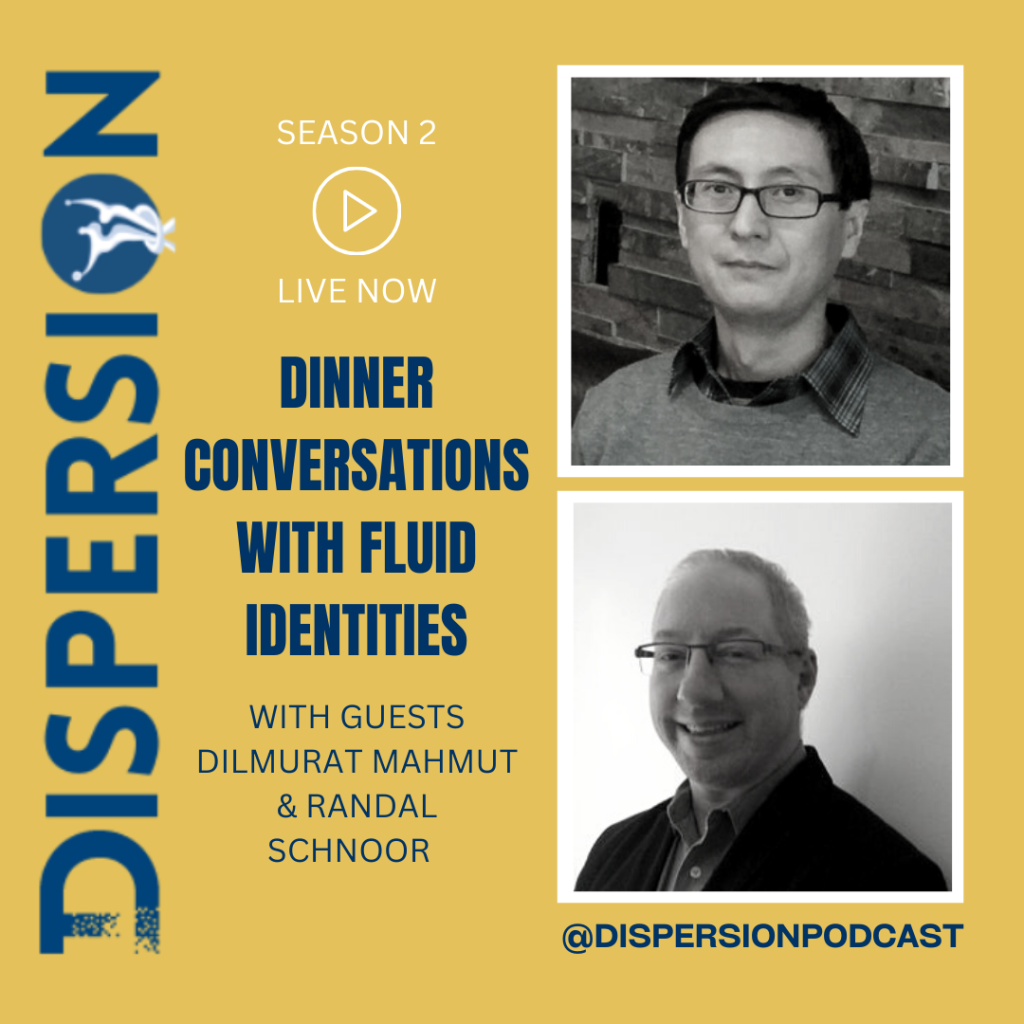

Episode 1: Why Can’t We All Eat Hummus & Get Along?
In this episode, Samira and Shayan discuss how food contributes to identity formation and cultural connection, and how they have come to understand food as a political tool. This episode explores community building, multiculturalism, racism, and cultural erasure and assimilation as they relate to food.
Episode 2: Conflict, Cultural Preservation, and Coalescing Identities
War, Conflict and Diaspora: In this episode, Anu and Anastasia explore how conflicts in the homeland influence community cohesion and mobilization, and cultural preservation in diaspora. They discuss how conflicts in their respective homelands influenced their own career trajectories, and generational differences in how those living in diaspora interact with events taking place in the homeland.


Episode 3: Dinner Conversations and Fluid Identities
Religion and Diaspora: In this episode Randal and Dilmurat discuss the inseparable nature of their cultural and religious identities, and how histories of persecution based on religion have contributed to a strong sense of peoplehood within their religious diaspora communities. This episode explores fluid and intersecting identities, and cross generational education.
Episode 4: Our Identities Don’t End at the City Limits
Indigeneity and Diaspora: In this episode, Jean-Paul and Sacha have a candid conversation about their Indigenous identities as they relate to land and place, and the complexities they face in navigating their identities while living in urban spaces. This episode explores tensions between Indigenous ways of knowing and relationships with the land, and the ownership words utilized in Diaspora Studies.

Episode 5: One Word: Boundaries
Gender, Sexuality and Diaspora: In this episode, Ilaneet and Aida discuss the complexities of navigating their gender and sexual identities in different diasporic spaces. They dive into the challenges of acknowledging gender norms in diverse social spaces while not being prescriptive, the tensions surrounding feminism, and the importance of maintaining boundaries in different settings.


Dr. Jean-Paul Restoule is Professor and Chair of the Department of Indigenous Education at University of Victoria. He is Anishinabe from Dokis First Nation in Ontario, and his research focuses on bringing Indigenous worldviews to a wide audience. He is principal investigator of a SSHRC Insight Grant on supporting teachers to adopt Indigenous perspectives in their practice. Restoule is also co-editor of Indigenous Research: Theories, Practices, and Relationships, a collection for students and scholars interested in learning about Indigenous research.

Sacha DeWolfe is an assistant professor at Mount Allison University in the Canadian Studies Department. The focus of her PhD is investigating the social, political and historical factors contributing to her identity as a Mi’kmaq woman and how her life stories contribute to an expanded dialogue of Wabanaki identity. She was formerly the Director for the Office of First Nation Education at the Department of Education and Early Childhood Development in New Brunswick.

Dr. Randal F. Schnoor is a sociologist and has been teaching Religious Studies and Jewish Studies at York University since 2004. He has published sociological works on Jewish identity, Jewish day schools, Hasidic Jews, gay Jews among other contemporary topics. His recent policy research includes a large community study on Jewish poverty in Toronto, a study on approaches to engaging Jewish interfaith families, and a study on South African Jews in Toronto.

Dr. Dilmurat Mahmut is a research associate and a course lecturer in the Faculty of Education, McGill University. He is also Vice President of International Support for Uyghurs, a Montreal-based NGO. His research interests include Muslim identity in the West, religion, education, violent extremism, and immigrant/refugee integration in Canada and beyond.

Shayan Lallani is a PhD candidate in the Department of History at the University of Ottawa. His research examines how mass-market cruise lines in the American market produced cultural encounters in the late twentieth century. He has published his work on the cruise industry in Food, Culture & Society and Journal of Tourism History.

Samira Mohyeddin is an award winning producer at CBC Radio One’s national flagship show The Current and host of CBC food podcast Unforked. She has a Master of Arts in Gender and Modern Middle Eastern History from the University of Toronto and is a graduate of the Zoryan Institute’s Genocide and Human Rights Program (2006).

Ilaneet describes herself as a social worker by trade and an educator at heart, guided by the vision of a just and caring society. She is focused on facilitating learning and change on individual, organizational, and systemic levels. As a registered social worker, Ilaneet has worked in mental health using trauma-informed and anti-oppressive practice.

Aida Gregorian holds a BA with honours in political science and a juris doctorate. She is a lawyer, independent researcher, human rights defender, and proponent of intersectional and Indigenous based feminist activism. She has worked for various top law firms, banks, and NGOs throughout her career. Recently, following the outbreak of war in Artsakh, she left for Armenia to coordinate the provision of humanitarian aid to Indigenous Armenian refugees.

Anastasia Leshchyshyn is a PhD Student at McGill University in the Department of Political Science. She holds an MA in European and Russian Affairs and a BA in History, Political Science, and Classical Civilization. Her research interests include ongoing political and institutional reform processes in Ukraine. She was formerly a Research Associate at the Canadian Institute of Ukrainian Studies, in the division dedicated to the study of the Holodomor.

Anuppiriya Sriskandarajah is an assistant professor in the Child, Childhood, and Youth Program at York University. Her area of research includes transnationalism, youth belonging, youth digital activism, race and space, and girlhood studies. She was recently awarded a SSHRC Connections grant for a digital film project “Motion | Stop | Motion: Self-Imaging Racialized Girlhoods in the Time of COVID-19”.



